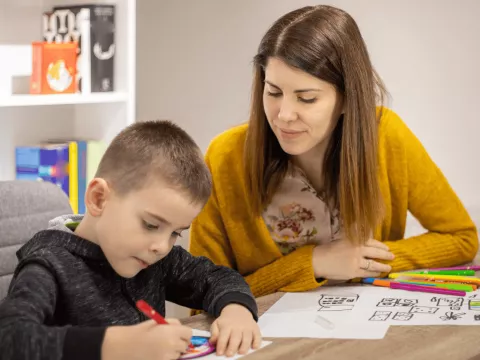- AdventHealth

Choose the health content that’s right for you, and get it delivered right in your inbox.
Once you have a child, it goes without saying you'll have worries alongside the joys of parenting from here on out. While some stress is normal and necessary to motivate us to act and make healthy decisions for our families, parents are so severely overtaxed that the Surgeon General issued an Advisory deeming parental mental health a “serious public health concern.”
U.S. Surgeon General Dr. Vivek H. Murthy stated, “Addressing parental mental health conditions, and importantly the underlying stressors and causes, is critical for the well-being of children and society.”
Remember, taking care of us is a big part of caring for our children. Keep reading as we delve deeper into the parental mental health crisis and how we can best support each other and ourselves.
Transcending Traditional Family Stressors
Along with all the traditional parent stressors, like providing for our kids, caring for their basic needs, navigating childhood sicknesses, teenage independence, school, work-life balance and more, parents face serious contemporary issues that impact our kids’ well-being, keeping us reeling inside 24/7.
Newer parental concerns include and are not limited to:
- A youth mental health epidemic
- Constant presence of screens
- Cyberbullying and traditional bullying
- Economy that forces many parents to work more than one job
- Influence of social media
- Loneliness epidemic
- Unreasonable societal expectations
Along with the above, widespread fear about health and safety issues follows families everywhere they go — from the classroom bully to the cyberbully that infiltrates your child’s bedroom laptop. It’s clear that we live in a different world now, and parents are feeling the effects.
A Culture of Independence Can Isolate
As a society that tends toward individualism and personal responsibility, it can be surprising to learn that in many cultures, parental wellness is a primary concern rather than secondary to their children. Like a butterfly effect, it’s understood that the well-being of a community depends on the health of families and that children’s health within the home depends on parental well-being.
While many parents have the advantage of a caring co-parent allowing them to tag-team, the support of extended family and a larger community, not everyone is so fortunate and finds themselves completely isolated. There are two-parent homes without extended family nearby and single parents who may find themselves completely alone and without a safety net.
What You Can Do
You're not superhuman and don't have to pretend to be. If you and your parenting partner find yourselves alone, or you’re a single parent, here are some self-care actions you can take:
- Live healthily: Putting your health isn’t selfish. It’s part of caring for your family. Eat a nutritious diet, get regular exercise, and take a high-quality multivitamin
- Find a provider: Routine health care reduces many poor health outcomes, including mental health, because your primary care provider can screen for mental health conditions
- Go to a counselor: Counseling can be especially helpful for parents who already struggle with mental health challenges or are having a difficult time in life
- Learn to say no: Knowing when to say no to unnecessary requests and extras will help you place boundaries around you and your family’s sacred space
- Take time for yourself: Carving out some sacred time just for you is essential. You can take a walk, a bath, read a book or whatever makes you feel whole
What We Can Do
We're all busy with our lives and the details of each day, so it's easy to forget that our friends and neighbors could use an extra pair of hands or just a listening ear. Here are some ways to offer support to parents in need. And don't forget to accept support for you when offered:
- Ask what they need: If they say they don’t know, offer something specific and do it. You could cook a surprise meal or offer to babysit
- Check-in: A quick text, phone call, or email lets the person know they're thought of and opens the door for communication if they need support
- Encourage connection: While support from family and friends is crucial to parental mental health, some don’t have that luxury; connecting with parents at a similar stage in their parenting journey can help all parties know they’re not alone, so if you see someone struggling, invite them to your corner
- Get others involved: You can plan with others in your friend circle, neighborhood, church community and family to help a parent struggling with hardships
- Talk about the hard things: Help destigmatize mental illness and the cultural norms that lead to those stigmas by talking openly about mental health and the challenges that compromise our well-being
Building Community Matters
The key takeaway is that parents need support, and people need community. In a world that's more connected than ever technologically, we're also lonelier and more disconnected as we navigate serious challenges that generations before us could have never predicted.
At AdventHealth, we’re here to help you build your support system. If you’re struggling, reach out to our compassionate AdventHealth behavioral health specialists for a personalized treatment plan and expert care that sees the whole you. You deserve to feel whole — in body, mind and spirit.


